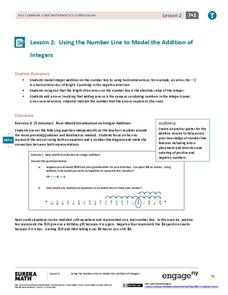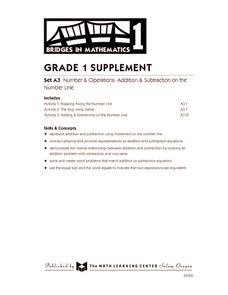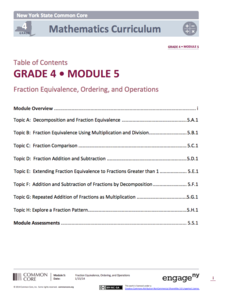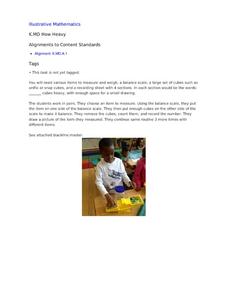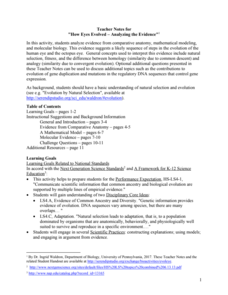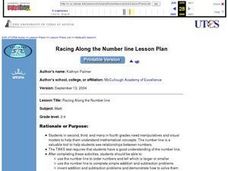EngageNY
Addition and Subtraction of Rational Numbers
Apply addition and subtraction of integers to solve problems with rational numbers. Pupils apply the rules for adding and subtracting integers to add and subtract rational numbers. Class members represent the problem with equations and...
EngageNY
Using the Number Line to Model the Addition of Integers
The second lesson in a series of 25 shows the class how to use arrows and a number line to add integers. Learners apply their knowledge of the commutative property and absolute value in their explanations. Classmates play the integer...
Math Learning Center
Grade 1 Supplement Set A4 – Number and Operations: Equivalent Names
Engage young mathematicians in developing their basic arithmetic skills with these great hands-on activities. Using Unifix® cubes to model a variety of single digit addition and subtract problems, children build a basic...
BioEd Online
Arm Model
Arm your young scientists with knowledge about anatomy as they build their own model of the elbow joint. Help them get a firm grasp on how muscles and bones interact to allow movement as they try different positions for the muscles on...
EngageNY
Relationships Between Quantities and Reasoning with Equations and Their Graphs
Graphing all kinds of situations in one and two variables is the focus of this detailed unit of daily lessons, teaching notes, and assessments. Learners start with piece-wise functions and work their way through setting up and solving...
Math Learning Center
Grade 1 Supplement Set A3 - Number and Operations: Addition and Subtraction on the Number Line
Hop your way through a mathematical equation with your first grade class as they learn the idea of moving up and down the number line. Adding and subtracting like little frogs is an engaging and clever way to teach/reinforce this concept.
Laura Candler
Fishbowl Multiplication
Transition young mathematicians from using repeated addition to multiplication with this fun, hands-on activity. Using manipulatives and the included game board, students work in pairs modeling repeated addition problems before...
Scholastic
Adding and Subtracting Ten
Developing fluency with basic addition and subtraction is fundamental to the success of all young mathematicians. This four-day lesson series begins with learners using ten-frames and hundreds charts to recognize patterns when adding and...
Kentucky Department of Education
Multiplication Grade 3 Formative Assessment Lesson
Guide multiplication lesson plan instruction with a formative assessment. Mathematicians are given two multiplication problems to solve and represent using the area model, equal groups, repeated addition, and word problems. Following the...
Granite School District
Activities that Build Number Sense
Have fun while building the number sense of young mathematicians with this list of ten-frame learning games. From developing cardinality and counting skills to learning place value and basic addition strategies, ten-frames are excellent...
EngageNY
Fraction Equivalence, Ordering, and Operations
Need a unit to teach fractions to fourth graders? Look no further than this well-developed and thorough set of lessons that takes teachers through all steps of planning, implementing, and assessing their lessons. Divided into eight...
National Math + Science Initative
Introduction to Decimals
Three activities make up an introductory instructional activity designed to create a strong foundation in comparing fractions to decimals and exploring and building decimal models. Pupils brainstorm and complete a Venn diagram to show...
Illustrative Mathematics
3-D Shape Sort
From the apple on your desk and the coffee cup in your hand, to the cabinets along the classroom wall, basic three-dimensional shapes are found everywhere in the world around us. Introduce young mathematicians to the these common figures...
Council for the Curriculum, Examinations and Assessment
Morals, Values and Beliefs
Your personality is based on the things you believe in, the morals you abide by, and the values upon which you make your decisions. Delve into a set of lessons about values and moral framework with your eighth graders as...
Penguin Books
An Educator’s Guide to Ruta Sepetys
Historical fiction novels give readers a chance to step into someone else's shoes. An educator's guide from Penguin Common Core Lesson Plans provides resources to accompany three historical fiction novels written by Ruta Sepetys: Between...
Curated OER
How Heavy
Break out the balances for this primary grade lesson on weight measurement. Using common elementary school manipulatives like unifix or snap cubes, young mathematicians determine the weight of four different classroom objects. A graphic...
K-5 Math Teaching Resources
Large Five Frames with Dots
Enhance young mathematicians' counting strategies using this large five frames printable. Here, you'll find a large one by five array with red counters to support adding and subtracting through visual images of numbers one through...
EngageNY
Even and Odd Numbers
Even or not, here I come. Groups investigate the parity of products and sums of whole numbers in the 17th lesson plan in a series of 21. Using dots to represent numbers, they develop a pattern for the products of two even numbers; two...
Astronomical Society of the Pacific
Getting Ready for the All American Eclipse!
Give your pupils a front row seat at the biggest light show in the sky this year! In addition to admiring the total solar eclipse, young astronomers can explain the phenomenon with a little help from an inquiry-based instructional...
Curated OER
Sphere Dressing
Geometric design makes a fashion statement! Challenge learners to design a hat to fit a Styrofoam model. Specifications are clear and pupils use concepts related to three-dimensional objects including volume of irregular shapes and...
Serendip
How Eyes Evolved – Analyzing the Evidence
Octopodes existed for hundreds of thousands of years before humans, yet our eyes share many similarities. Scholars analyze the evidence to determine if the evolution of eyes best fits a homology or analogy model. They discuss the issue...
Foundation for Water & Energy Education
What is the Water Cycle? Activity B
Curious physical scientists follow a lesson on the properties of water with this lesson on distillation. They observe a miniature water cycle model that filters dirty water into clean water. These two lessons combined are an enriching...
Serendip
Understanding How Genes Are Inherited via Meiosis and Fertilization
Bring the excitement of genetics to scholars with a dynamic hands-on meiosis modeling experience. During the activity, biologists follow step-by-step procedures to build chromosomes, model independent assortment, learn about crossing...
Curated OER
Racing Along the Number Line
Manipulatives and visual models really help youngsters understand mathematical concepts. One activity provided here gives every learner their own white board and accompanying number. Then learners have to put themselves in order, holding...

